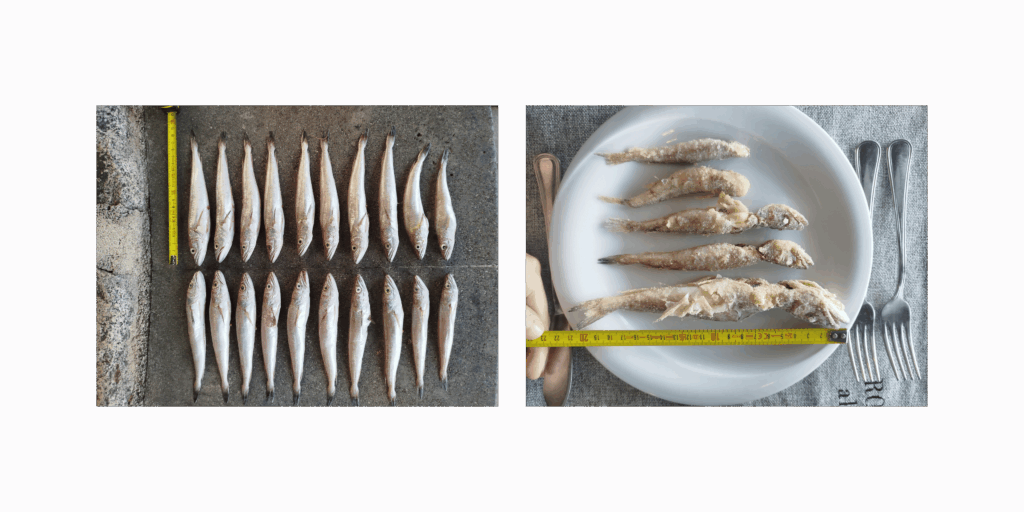Report uncovers extensive sale of juvenile hake in Italian ports, flouting EU rules
Press Release Date: June 24, 2025
Location: Brussels
Contact:
Emily Fairless | email: efairless@oceana.org | tel.: +32 478 038 490
Evidence points towards illicit trade
Italian consumers support stronger enforcement of rules, survey reveals
Once considered a staple of light Italian cuisine, hake is now in deep trouble in the Mediterranean. A new report out today by Oceana, Sea Shepherd, and consumer organisations Altroconsumo and OCU, reveals extensive sales of juvenile hake in Italian ports, in contravention of EU rules. It also shows strong public support for better enforcement and sustainable seafood choices.
An investigation by Oceana, in collaboration with Sea Shepherd, uncovered that 91% of bottom trawlers, stalls, and markets surveyed in seven selected locations in Italy sold undersized hake, in violation of EU rules. Further, an accompanying survey by Italian consumer organisation Altroconsumo showed that nine out of ten respondents in Italy recognised that fishing and selling undersized fish is a serious issue for marine biodiversity and called for stronger enforcement of existing rules. Finally, nearly eight out of ten respondents indicated that they would like to receive more information about the regulations protecting species at risk in the Mediterranean.
The fieldwork for the investigation, carried out in May 2025, targeted seven coastal locations along Italy’s western Mediterranean coast in Tuscany, Lazio, Campania, and Sicily, selected due to their high bottom trawling activity in hake nursery areas. Oceana, together with Sea Shepherd, documented the sale, in plain sight, of undersized hake directly from boats or market stalls to consumers. In some cases, the team found undersized hake to be also sold in fishmongers and served in nearby restaurants.

Juvenile hake under legal size in a restaurant (left) and bought from a trawler (right) uncovered in Oceana & Sea Shepherd investigation (© OCEANA / Javier López)
“Our investigation reveals a widespread and largely unmonitored illicit trade in juvenile hake taking place very visibly in Italian ports. This not only violates EU law, but also threatens the recovery of one of the Mediterranean’s most overfished species,” said Giulia Guadagnoli, Senior policy advisor at Oceana in Europe. “We call on Italian authorities to step up enforcement and to put an end to this practice. We also urge the European Commission to ensure full compliance with EU fisheries rules. Doing so will benefit hake, the Mediterranean, and ultimately fishers.”
Hake is in a dire state throughout the Mediterranean. To curb overfishing and rebuild fish abundance, the EU adopted the western Mediterranean multiannual plan in 2019, setting a legal deadline to end overfishing by 1 January 2025. However, weak implementation by countries has hampered progress. Practices, such as the sale of juvenile hake, continue to undermine the plan’s objectives, punishing fishers and retailers who abide by the rules, and rewarding those who don’t. Under EU law, catching undersized hake is not in itself illegal, but selling it for human consumption is prohibited.
Andrea Morello, President of Sea Shepherd Italy, added: “Our life on Earth depends on the ocean. Allowing the illicit selling of juvenile species like hake in the Mediterranean can compromise the future. The European Union must act decisively and honour its role, not only as guardian of the living world, but as guardian of the seas and lands. Today, much of what is marketed as sustainable is, in fact, ecologically unsustainable. Transparency and integrity are not optional – they are the foundation for protecting both the ocean and the public.”
The investigation also identified Spanish online retailers advertising the sale of juvenile hake on their websites, reportedly imported from Italy, posing challenges for traceability and enforcement.
“Our survey reveals how difficult it is for Italian consumers to make the right choices when buying fish, as legal sizes are poorly known. A real cultural change is needed through targeted campaigns to increase both consumer awareness and that of retailers” said Federico Cavallo, Head of public affairs & media relations at Altroconsumo. “However, this need not be a conflict between consumers and fishers, who also have a vested interest in sustainable fishing to guarantee a lasting future for the sector. Controls need to be in place to protect those who operate correctly, while at European level, schemes – including ones concerning subsidies – should incentivise those who actively commit to sustainability.”
To tackle this problem and help the recovery of hake in the western Mediterranean, Oceana, Sea Shepherd, Altroconsumo, and OCU are calling on Italy and other western Mediterranean countries, to:
- Strengthen enforcement – step up inspections at-sea and in ports, and increase checks in markets and restaurants.
- Improve fishing selectivity – make larger mesh sizes obligatory to prevent the catching of juveniles, and expand closures in nursery and spawning areas.
- Increase consumer awareness and improve seafood labelling – via public information campaigns to promote responsible purchasing choices, and the requirement of clear information to consumers.
Further, the European Commission must also ensure that national authorities are enforcing the rules of the western Mediterranean multiannual plan, and are dedicating adequate resources to inspections in ports and markets.

